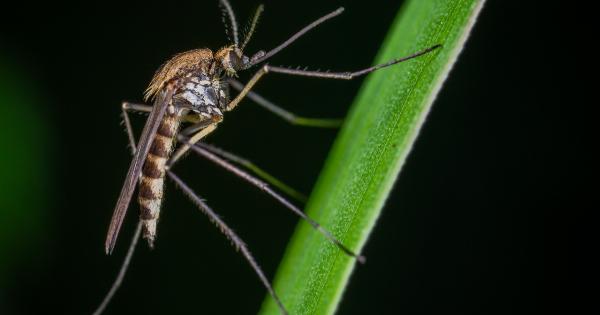Mosquitoes are not only annoying insects that can ruin a pleasant evening outdoors, but they can also be carriers of deadly diseases. One such disease is West Nile virus, which can have serious health consequences.
It is important to take measures to prevent mosquito bites and protect ourselves and our loved ones from this virus. In this article, we will discuss effective methods to avoid mosquito bites and minimize the risk of contracting West Nile virus.
Understanding West Nile Virus
West Nile virus is a disease that is primarily transmitted to humans through the bite of infected mosquitoes.
While most infected individuals experience mild symptoms or no symptoms at all, in some cases, the virus can lead to severe illness and, in rare instances, even death. It is essential to be aware of the risks associated with West Nile virus and to take preventative measures to minimize exposure.
1. Use Mosquito Repellents
One of the simplest and most effective ways to prevent mosquito bites is to use mosquito repellents. Look for repellents that contain ingredients such as DEET, picaridin, or oil of lemon eucalyptus.
Apply the repellent according to the product instructions, and reapply as necessary, especially if you are spending an extended period outdoors. Remember to avoid spraying repellent directly on cuts, wounds, or irritated skin.
2. Dress Appropriately
Mosquitoes tend to be more attracted to dark clothing, so wearing lighter-colored and loose-fitting garments can help reduce the likelihood of attracting them.
Additionally, covering exposed skin by wearing long sleeves, long pants, and socks can provide an extra layer of protection against mosquito bites. This is particularly important during dusk and dawn when mosquitoes are most active.
3. Eliminate Standing Water
Mosquitoes require standing water to breed, so by eliminating potential breeding grounds, you can significantly reduce mosquito populations in your surroundings.
Regularly check your property for areas where water can accumulate, such as flower pots, buckets, birdbaths, and clogged gutters. Ensure that containers are empty, and consider adding sand or gravel to low-lying areas that tend to collect water.
4. Use Mosquito Nets
If you live in an area with a high mosquito population or are planning a trip to such an area, consider using mosquito nets. Bed nets treated with insecticide are particularly effective in preventing mosquito bites while sleeping.
These nets create a physical barrier between you and the mosquitoes, offering a safe and peaceful sleep without the annoyance of buzzing insects.
5. Keep Doors and Windows Screened
Another effective way to keep mosquitoes out of your home is to install screens on doors and windows. Ensure that these screens are in good condition and free from gaps or tears that mosquitoes could exploit.
By keeping doors and windows closed, especially during peak mosquito activity, you can create a barrier that helps protect your living spaces from these unwanted intruders.
6. Avoid Peak Mosquito Hours
Mosquitoes are most active during dawn and dusk. Avoiding outdoor activities during these times can significantly reduce the chances of getting bitten.
If it is necessary to be outside during these hours, take extra precautions such as using mosquito repellents, wearing protective clothing, and seeking shelter in areas with minimal mosquito presence, such as enclosed gazebos or screened porches.
7. Maintain a Well-Maintained Yard
Keeping your yard well-maintained is essential in controlling mosquito populations. Regularly mow the lawn, trim shrubs, and remove any debris or clutter that may provide hiding spots or breeding grounds for mosquitoes.
Consider using mosquito-repelling plants, such as citronella, lavender, or marigolds, in your landscaping to naturally discourage mosquitoes from lingering in your outdoor spaces.
8. Stay Informed and Report Potential Breeding Spots
Stay informed about the West Nile virus activity in your area by following local health department updates or news releases.
Additionally, if you notice potential mosquito breeding spots in public areas, such as stagnant water in neglected swimming pools or abandoned tires, report them to local authorities. Awareness and responsible reporting can contribute to community mosquito control efforts.
9. Seek Medical Attention When Needed
If you experience symptoms such as fever, headache, body aches, or rash after being bitten by mosquitoes, especially in areas with known cases of West Nile virus, seek medical attention promptly.
Early diagnosis and intervention can help in managing the symptoms and preventing complications associated with the virus.
10. Community Efforts Against Mosquitoes
Preventing mosquito bites and combating West Nile virus is not only an individual responsibility but also a collective effort.
Support your local community’s mosquito control initiatives, such as mosquito spraying programs or public education campaigns. By working together and raising awareness, we can minimize mosquito populations and reduce the risk of West Nile virus transmission to protect the health and well-being of our communities.




























